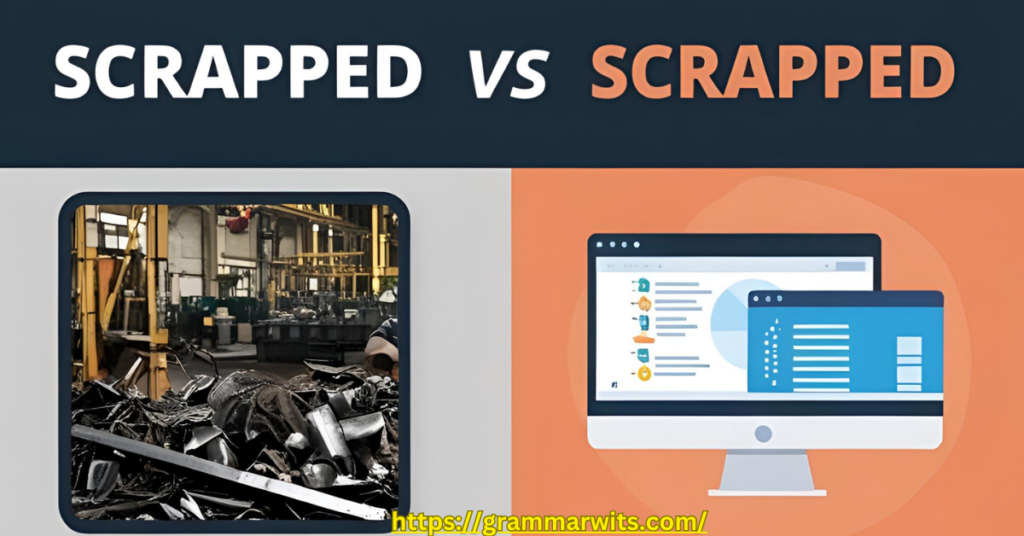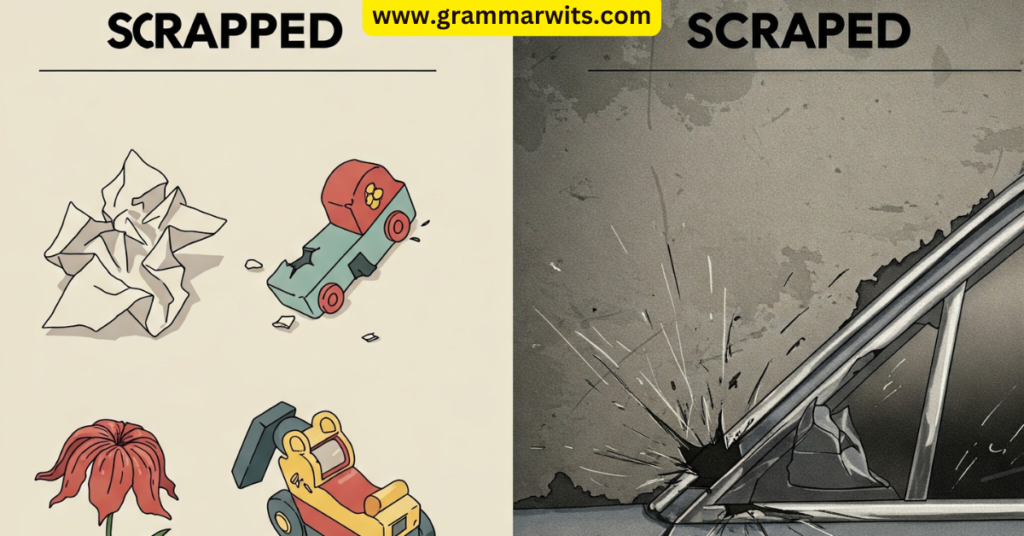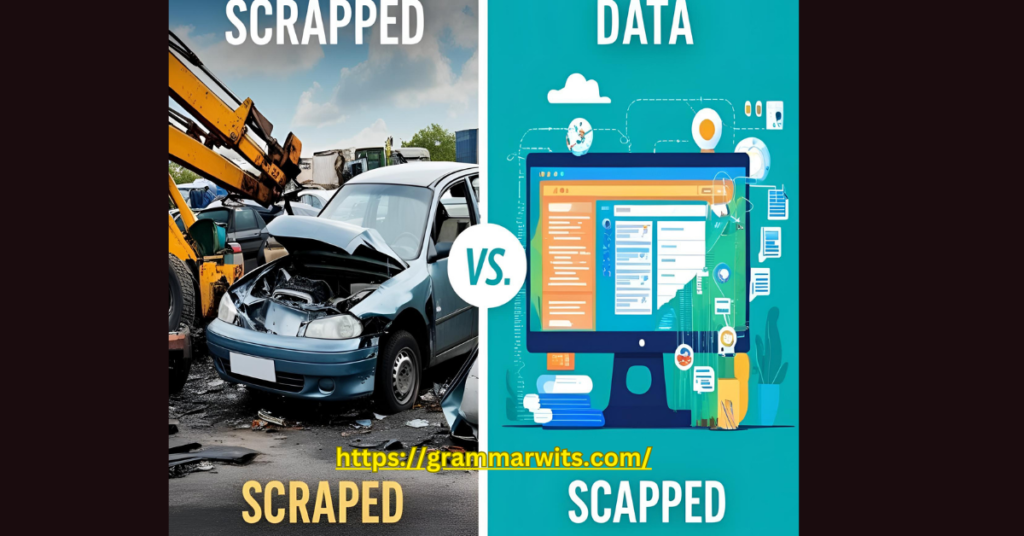Is it scrapped or scraped lets clarify the meaning of these commonly confused words to avoid errors in writing.
Scrapped and scraped are two words that often cause confusion due to their similar spellings, yet their meanings differ significantly. Scrapped refers to discarding, canceling, or permanently getting rid of something, such as a failed project or outdated equipment. On the other hand, scraped means removing material by dragging or scratching, often used to describe physical friction, minor injuries, or barely passing a requirement. Though they may sound somewhat alike, their contextual usage sets them apart entirely.
Mixing up these words can lead to serious misunderstandings in writing and speech. Imagine telling someone that a project was scraped instead of scrapped—you might leave them wondering if it was physically scratched instead of canceled! Whether you’re a student, writer, or professional, choosing the right word enhances sentence clarity and prevents embarrassing mistakes.
This article will clear up the confusion once and for all, providing detailed explanations, real-world examples, and useful comparisons. By the end, you’ll confidently know when to use scrapped and when to use scraped, ensuring your writing remains polished and precise. Let’s dive into the details and make sure you never second-guess these words again!
Why is There Confusion Between Scrapped and Scraped?

Is it scrapped or scraped lets clarify by looking at the differences in their definitions and usage. Many English words cause linguistic confusion because of homophones, heterographs, and similar spellings. In this case, scrapped and scraped share some phonetic resemblance, but their meanings and usage differ significantly.
- Similar Sound but Different Spellings – While not exact homophones, the words can sound alike in casual speech, leading to mix-ups.
- Both Are Past-Tense Verbs – Since scrap and scrape are verbs in their base form, people mistakenly use them interchangeably.
- Overlapping Contexts – In some cases, both words refer to removing or eliminating something, making their meanings appear similar at first glance.
Understanding their precise lexical semantics prevents errors in writing accuracy and everyday speech.
⚡ Quick Summary: Scrapped vs. Scraped
Many people confuse scrapped and scraped due to their similar spellings, but they have entirely different meanings.
- Scrapped means discarded, canceled, or abandoned (e.g., The project was scrapped due to budget cuts).
- Scraped means scratched, removed with friction, or barely succeeded (e.g., He scraped his knee on the pavement or She scraped through the exam).
Key Differences
| Word | Meaning | Common Uses |
|---|---|---|
| Scrapped | To abandon or cancel | Projects, ideas, discarded materials |
| Scraped | To scratch, remove, or barely pass | Surface damage, removing layers, minimal success |
How to Remember?
- Scrapped = Gone for good (like scrapped metal).
- Scraped = A surface-level impact (like scraping your knee).
This guide covers definitions, examples, synonyms, and language precision tips to help you avoid common writing mistakes. 🚀
What Does the Word “Scrapped” Mean?
The verb scrapped is the past tense of scrap. It refers to getting rid of, canceling, or abandoning something. When you scrap something, you discard it because it’s useless or no longer needed. To prevent confusion, is it scrapped or scraped lets clarify which term to use based on the context.
Common Uses of “Scrapped”
- Project cancellations – The company scrapped the new product due to budget cuts.
- Disposal of materials – The old car was scrapped for metal parts.
- Abandoning ideas or plans – The team scrapped the proposal after client feedback.
In each case, scrapped implies permanent removal or discontinuation. It’s about something being abandoned, canceled, or discarded entirely.
What Does the Word “Scraped” Mean?
The verb scraped is the past tense of scrape, which means to drag, scratch, or remove something with force or friction. It has both literal and figurative meanings. Many people often mix up these words, so is it scrapped or scraped lets clarify the correct one for your sentence.
Common Uses of “Scraped”
- Physical damage – He scraped his knee when he fell off the bike.
- Removing material – She scraped the paint off the wall.
- Barely achieving something – He scraped through the final exam with a passing grade.
- Data collection – The program scraped data from various websites.
Unlike scrapped, which means to discard, scraped involves surface-level removal or contact and is often associated with scratching, skimming, or barely passing a threshold.
Scrapped vs. Scraped: Key Differences

Both words differ in meaning, function, and application. Here’s a simple comparison:
| Feature | Scrapped | Scraped |
|---|---|---|
| Base verb | Scrap | Scrape |
| Meaning | To discard, abandon, or cancel something | To drag, scratch, or remove with friction |
| Common Usage | Canceling projects, discarding items | Surface removal, injuries, barely succeeding |
| Example | The film was scrapped due to budget issues. | She scraped her knee on the pavement. |
| Figurative Use | Yes – Scrapped an idea (abandoned a plan) | Yes – Scraped through a test (barely passed) |
Understanding these differences ensures sentence clarity and helps avoid grammar mistakes in writing and speech.
Which One Should You Use: Scrapped or Scraped?
SCRAPPED
When deciding whether to use scrapped or scraped, it’s essential to consider the context of the action you’re describing. Scrapped refers to the act of discarding, abandoning, or canceling something, often something that’s no longer useful, functional, or relevant. For example, if a company decides to scrap a product line because it’s not performing well in the market, or if a city scraps a construction project due to budget cuts, this means the plans or items are permanently set aside or removed from further consideration. Scrapped is often used in business, project management, or general situations where something is abandoned due to irrelevance, failure, or changed circumstances. It implies a final decision to eliminate whatever is being scrapped, with no intention of reuse or recovery.
SCRAPED
On the other hand, scraped is typically used when referring to the physical act of removing something from a surface or scratching an object in a way that involves friction. For example, if you’re scraping paint off a wall or scraping the ice off your windshield, you are actively using force to remove or clean something off a surface. Scraped can also describe slight injuries or damage, like when you scrape your knee while falling. Additionally, it’s used in figurative language to express barely passing or succeeding in something—like scraping through an exam. The key distinction is that scraped involves surface-level removal or minor efforts to remove, whereas scrapped refers to abandoning or discontinuing something altogether. Understanding the difference between these two words ensures that you use them correctly in your writing and speech.
If you’re unsure which word to use, ask yourself:
- Am I talking about canceling or abandoning something?
- ✅ Use scrapped (They scrapped the old software system.)
- Am I describing friction, surface damage, or slight removal?
- ✅ Use scraped (He scraped the dirt off his shoes.)
- Is it about barely achieving something?
- ✅ Use scraped (She scraped through the math test with a C-.)
By focusing on semantic accuracy, you can always choose the correct term.
Examples in Context

Scrapped in Sentences
- The city scrapped the new highway proposal after protests.
- She scrapped her travel plans due to bad weather.
- Old newspapers were scrapped and recycled.
- The school scrapped the outdated curriculum to introduce a new one.
- The company scrapped the old software system after discovering a better solution.
- Due to rising costs, the government scrapped the infrastructure project last year.
- They scrapped their vacation plans because of the unexpected storm.
- The design was scrapped after the client requested a complete overhaul.
- The movie was scrapped because the production team couldn’t agree on the script.
- The CEO scrapped the controversial marketing campaign after receiving backlash.
- After the new regulations were introduced, the initial plan was scrapped entirely.
- The team scrapped the previous approach and adopted a more innovative strategy.
- The proposal was scrapped due to a lack of funding and support.
- After several failed tests, the old prototype was scrapped in favor of a newer model.
Scraped in Sentences
- He scraped his elbow playing soccer.
- She scraped off the burnt edges of the toast.
- The car scraped against the wall, leaving a dent.
- He barely scraped through the interview but still got the job.
- She accidentally scraped her knee while running across the playground.
- I scraped the last bit of ice off the car window before driving to work.
- The painter scraped off the old paint before applying a fresh coat.
- He scraped through the exam with the minimum passing score.
- After the storm, we scraped the debris off the driveway to clear the path.
- The cat scraped its claws on the furniture, leaving visible marks.
- He scraped the last remnants of food from his plate before rinsing it.
- The mechanic scraped the rust off the metal surface to prepare it for repair.
- She scraped together enough money to buy a new laptop after her old one broke.
- The wood was scraped smooth to remove the rough edges before being stained.
These examples highlight word distinction and their correct usage in context.
Synonyms and Similar Terms
Scrapped
- Abandoned – The project was abandoned due to lack of funds.
- Discarded – They discarded the broken furniture.
- Eliminated – Unnecessary expenses were eliminated from the budget.
- Canceled – The event was canceled due to rain.
- Recycled – Processed for reuse after being discarded.
- Dismantled – Taken apart, often for disposal.
- Retired – No longer in use, often because it’s outdated.
- Thrown out – Discarded, often in a casual context.
- Abolished – Formally ended or discontinued, especially laws or practices.
Scraped
- Grazed – He grazed his knee while running.
- Scratched – She scratched the paint while moving the chair.
- Removed – She removed the stickers by scraping them off.
- Barely Passed – He barely passed his math exam.
- Rasped – Scraped roughly, often creating a harsh sound or texture.
- Shaved – Removed thin layers from a surface, typically with a sharp object.
- Scuffed – Made a slight abrasion on a surface, often resulting in a dull mark.
- Gouged – Made a deep cut or mark on a surface, usually through force.
These synonyms clarify word substitution and enhance vocabulary enhancement.
Etymology: Where Do “Scrapped” and “Scraped” Come From?

Understanding word origins helps clarify their meanings.
Origin of “Scrapped”
The word scrapped has its origins in the Old Norse word “skrap,” which meant a small piece or fragment of something. Initially, skrap referred to discarded or leftover bits, particularly materials that were no longer of value. Over time, this concept evolved, and the word morphed to represent scrap metal, which was discarded because it no longer had a primary use or function. The idea of discarding unwanted or unusable materials extended to other objects as well. In the modern context, scrapped has taken on the broader meaning of abandoning projects, ideas, or plans that are no longer seen as worthwhile or viable. For example, when a company scraps a product development initiative, it indicates that the project has been completely abandoned or canceled, similar to how outdated materials like metal are scrapped for their value or disposed of.
Origin of “Scraped”
The word scraped originates from the Middle English word “scrapen,” which meant to scratch or remove a surface layer. This term is closely related to the Old Norse word “skrapa,” which also conveyed the meaning of scraping or erasing something. Over time, scraping became associated with physical actions that involve friction or abrasion. In its earliest usage, it referred to the act of rubbing or scratching a surface to remove something from it, such as dirt, paint, or ice. As the language evolved, the word scraped also took on figurative meanings, particularly in the context of minimal achievement. For example, if someone scrapes through an exam, it implies they barely succeeded, just meeting the necessary requirements. The modern use of scraped continues to include both the physical act of removal through friction and the figurative sense of barely achieving something with minimal effort.
These etymologies highlight their morphology and semantic differentiation.
The Impact of “Scrapped” and “Scraped” on Environmental Sustainability
The terms scrapped and scraped not only play a role in everyday language but also have significant implications for environmental sustainability. Scrapping in the context of waste management typically refers to the discarding or recycling of materials such as scrap metal, electronics, and other goods that have reached the end of their life cycle. This process can help reduce landfill waste when these materials are properly recycled, contributing to resource conservation and environmental responsibility. On the other hand, scraping often refers to the physical removal of materials from surfaces, such as scraping paint off buildings or scraping ice from roads during winter. While it may seem minor, scraping can have environmental consequences depending on the chemicals or debris removed. Proper disposal and recycling of materials scraped from surfaces can mitigate harm to ecosystems.
FAQs
1. What is the main difference between scrapped and scraped?
Scrapped means abandoned or canceled, while scraped means scratched, removed, or barely passed.
2. Can scrapped and scraped be used interchangeably?
No, they have different meanings. Using them incorrectly can cause sentence clarity issues.
3. Is it scrapped or scraped lets clarify the correct usage?
Use scrapped for discarding something permanently and scraped for surface-level removal or slight damage.
4. Can scraped mean barely passing a test?
Yes, “scraped through” means passing with the lowest possible score or effort.
5. Why do people confuse scrapped and scraped?
They sound similar, are both past-tense verbs, and sometimes appear in overlapping contexts, causing linguistic confusion.
Conclusion
Understanding the difference between scrapped and scraped is important for clear writing. Scrapped means something is abandoned, canceled, or discarded, while scraped means something was scratched, removed, or barely achieved. These words may look similar, but their meanings are completely different. Using the wrong word can cause confusion, especially in professional or academic writing. So, when asking, “is it scrapped or scraped lets clarify,” always think about the context first.
If you mean something is gone for good, use scrapped. If you mean a surface-level effect or slight removal, use scraped. Simple mistakes like these can weaken your writing, so learning their correct usage improves language precision. Now that we’ve answered “is it scrapped or scraped lets clarify,” you can confidently use these words without second-guessing yourself. Keep practicing, and soon, choosing the right word will feel effortless! 🚀

Alizy Smith is a passionate language enthusiast and the admin of Grammar Wits. With a love for wordplay, grammar quirks, and witty expressions, she’s dedicated to making language learning fun and accessible. From grammar tips to pun-filled laughs, Alizy ensures every piece of content entertains while educating — turning tricky rules into easy, enjoyable reads.
